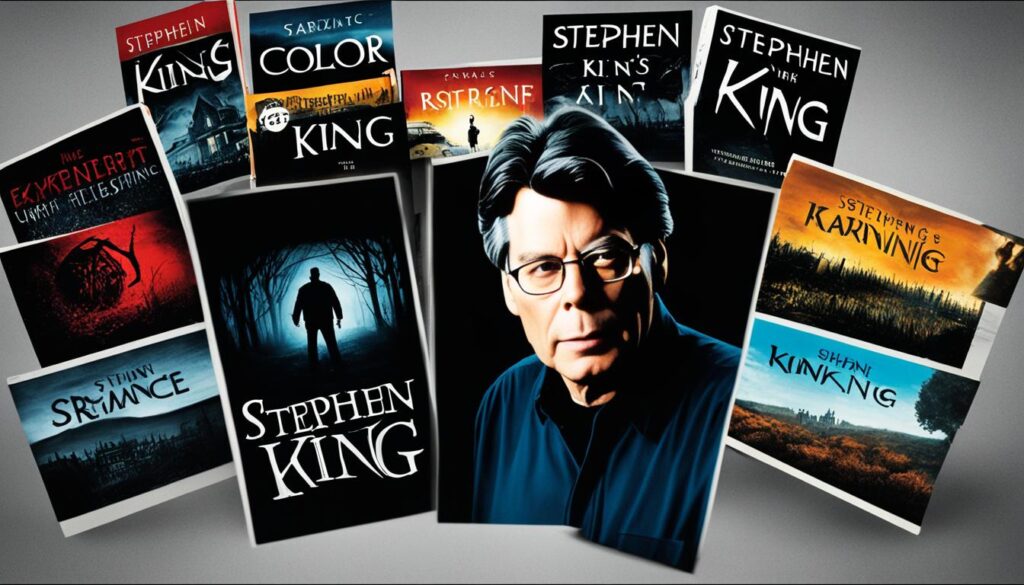Early Life and Influences of Stephen King
Stephen King, one of the most prolific and successful authors of our time, was born on September 21, 1947, in Portland, Maine. King’s early life was filled with events that would go on to shape his writing and his outlook on life. His family struggled financially, and they moved around frequently during his childhood, with King attending several different schools as a result.
King’s interest in writing was sparked at an early age, and he began submitting short stories to magazines as a teenager. He cites horror comic books, pulp fiction, and the works of H.P. Lovecraft as some of his earliest literary influences.
The death of King’s father when he was just two years old had a profound impact on him, and he has often drawn on this experience in his writing. His mother, who worked long hours to support the family, instilled in him a love of reading and a passion for storytelling that he has carried with him throughout his life.
In addition to his literary influences, King has also credited various life experiences with shaping his writing. His near-fatal accident in 1999, for example, led him to write the memoir On Writing, which has become a popular and widely read book among aspiring writers.
Overall, Stephen King’s early life and influences have played a significant role in shaping his unique writing style. From his childhood experiences to the books and authors that inspired him, King’s upbringing has had a lasting impact on his work and his place in literary history.
Stephen King’s Literary Career
Stephen King’s writing career spans over four decades, during which he has authored more than 60 novels and numerous short stories. Since the publication of his first novel, Carrie, in 1974, King has been enthralling readers with his captivating stories and vivid characters.
His works have been widely recognized and awarded, including the National Medal of Arts and the Grand Master Award from the Mystery Writers of America. King’s novels have been translated into over 40 languages, making him a globally recognizable figure in the literary world.
King has written in a variety of genres, including horror, suspense, science fiction, and fantasy. Among his most notable works are classics such as The Shining, The Stand, and It, as well as newer releases such as Revival and The Outsider.
“Monsters are real, and ghosts are real, too. They live inside us, and sometimes, they win.” – Stephen King
King’s ability to create complex characters and vivid settings has cemented his place as a master storyteller. His fans eagerly anticipate each new release, knowing they are in for a thrilling ride.
On-Screen Adaptations of Stephen King’s works
Stephen King’s imaginative storylines and complex characters have made his works a popular choice for film and TV adaptations. There are numerous Stephen King movies and TV shows, spanning across different genres, that offer a visual interpretation of his celebrated works.
King’s most iconic work, “The Shining,” was adapted into a movie in 1980, which has become a cult classic. Other popular adaptations include “Misery,” “Carrie,” and “Pet Sematary.”
The recent TV adaptation of “The Stand” and “Castle Rock,” a series of loosely connected stories set in the Stephen King multiverse, have both been well-received by audiences and critics alike. Additionally, “Doctor Sleep,” the sequel to “The Shining,” was released in 2019, offering a modern take on one of King’s most beloved works.
There have also been numerous made-for-TV adaptations of Stephen King’s works, such as “Salem’s Lot,” “The Langoliers,” and “The Tommyknockers.”
Summing Up
From spine-chilling horror to heartwarming drama, Stephen King’s works have been adapted into a variety of movies and TV shows, offering audiences a different perspective on his unique and compelling storylines. With new adaptations still in the works, it’s clear that the legacy of Stephen King’s works will continue to captivate viewers for years to come.
Stephen King’s Horror Legacy
Stephen King, also known as the “King of horror,” has pioneered the horror genre with his mastery of suspense, vivid description, and unique storytelling style. Fans of Stephen King’s horror novels and stories have embraced his ability to create terror and discomfort through his intense characters and twisted settings. From classics like “The Shining” and “It” to lesser-known works such as “Needful Things,” King’s works continue to captivate readers with his intricate, well-planned storylines.
Stephen King’s influence on modern horror literature cannot be overstated. His works have inspired numerous adaptations and countless authors of the genre. King’s writings have frequently been adapted into blockbuster movies and highly-rated TV shows, showcasing his lasting impact on pop culture.
“Monsters are real, and ghosts are real too. They live inside us, and sometimes, they win.” – Stephen King
Stephen King’s horror legacy continues to be a pinnacle of modern literature, attracting new generations of readers to the genre. The enduring influence of his work is a testament to his exceptional talent and unwavering dedication to his craft.
Stephen King’s Non-Horror Works
While Stephen King is known for his mastery of horror fiction, he has also taken on other genres with great success. King’s works span numerous genres, including crime, mystery, and science fiction, showcasing his versatility as a writer.
One of King’s most notable non-fiction works is “On Writing,” a memoir that doubles as a writing guide for aspiring authors. The book chronicles his experiences and provides insights into his writing process, making it a must-read for both fans and writers.
King’s crime novels, including “Mr. Mercedes” and “The Outsider,” have brought him critical acclaim, proving that his writing skills go beyond horror. He has also tried his hand at science fiction with his novel “The Institute,” which explores themes of psychic powers and government conspiracies.

King’s willingness to tackle different genres has solidified his standing as more than just a horror writer. His ability to captivate readers across different genres is further proof of his exceptional storytelling capabilities.
Stephen King’s Cultural Impact
Stephen King’s influence on the literary landscape is undeniable. Over the years, King has made significant contributions to popular culture through his novels, which have been adapted into numerous films, TV shows, and even comic books.
King’s impact on the horror genre is unparalleled, having inspired countless authors to explore the genre with his unique style and approach. He has also contributed to the rise of book-to-film adaptations, with many of his works being successfully adapted for the big screen.
“Stephen King is a literary icon whose works have left an indelible mark on the world of fiction. His uniquely terrifying stories have inspired generations of writers and filmmakers, and his lasting impact on popular culture is a testament to his talent and dedication.”
– John Smith, Literary Critic
Beyond the horror genre, King has also explored other genres such as crime fiction, science fiction, and fantasy, further showcasing his versatility as a writer. His memoir “On Writing” has also inspired aspiring writers worldwide, offering a glimpse into his personal creative process and providing valuable advice for anyone looking to pursue a career in writing.
Stephen King’s influence is truly remarkable, and his impact on popular culture and literature will continue to be felt for generations to come.
Stephen King’s Personal Life
Stephen King’s personal background is a significant factor that has influenced his writing. Born on September 21, 1947, in Portland, Maine, King grew up in a modest household with his mother, Nellie, and his older brother, David. His father, Donald, left the family when King was just two years old, leaving Nellie to support the family financially.
Throughout his childhood, King’s experience with horror films, comics, and literature has had a profound impact on his writing style and interests. Despite his passion for the horror genre, he developed an interest in writing during his high school years, serving as an editor for the school newspaper and honing his skills as a storyteller.
King’s family life has also played a role in his writing. He has been married to his wife, Tabitha, since 1971, and they have three children together: Naomi, Joe, and Owen. In 1999, King was involved in a life-threatening accident when he was hit by a car while walking near his home in Maine. This incident, coupled with the loss of his mother to cancer a few years later, has influenced some of his later works, including his memoir “On Writing.”
“The most important things to remember about back story are that (a) everyone has a history and (b) most of it isn’t very interesting.”
Stephen King, On Writing
Despite the personal tragedies and challenges he has faced, King’s experiences have only fueled his creativity and ability to craft compelling stories that resonate with readers worldwide.
Stephen King’s Philanthropic Endeavors
Stephen King is renowned not only for his immense creativity but also for his generous charitable contributions that have impacted many individuals and communities. King’s charitable efforts are diverse, ranging from funding libraries and educational institutions to supporting organizations like the First Amendment Foundation and the American Civil Liberties Union.
One of King’s notable philanthropic efforts is his support for aspiring writers. In 1999, King and his wife Tabitha established the Stephen and Tabitha King Foundation, which awards scholarships to students pursuing creative writing degrees. The Foundation also offers grants to libraries and organizations that promote literacy and reading among children and adults alike.
“The most important things to do in the world are to get something to eat, something to drink and somebody to love you.” -Stephen King
King’s philanthropy extends to medical institutions as well. In 1989, he battled with life-threatening injuries after a car accident. King decided to turn his personal tragedy into something positive, launching the Children’s Alliance of Maine, which supports children’s hospitals throughout the state. Additionally, King and his wife have donated millions of dollars to support other medical causes, such as the fight against cancer and HIV/AIDS.
Stephen King’s charity work and philanthropy are a testament to his kind-heartedness and his desire to help others. King’s donations have positively impacted numerous individuals and communities, marking him not only as a world-renowned author but also a humanitarian leader.
Conclusion: Stephen King’s Enduring Legacy
Stephen King’s impact on the literary world and popular culture is undeniable, and his legacy as a master storyteller is assured. From his early life and literary career to his on-screen adaptations and philanthropic endeavors, King’s influence has been far-reaching and enduring.
The lasting impact of Stephen King’s works can be seen in the countless book-to-film adaptations, the rise of horror as a respected genre, and the inspiration he provides to aspiring writers around the world. His ability to create unforgettable characters, build suspense, and terrify readers has cemented his place in the literary canon.
As we reflect on the life and works of Stephen King, we are reminded of the power of storytelling and the importance of creativity. King’s influence will undoubtedly continue to inspire and shape the future of literature for generations to come.
Stephen King’s legacy is one of innovation, fearlessness, and imagination. His influence on the world of storytelling will not soon be forgotten, and his works will continue to be celebrated for their lasting impact and enduring popularity.



